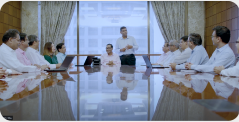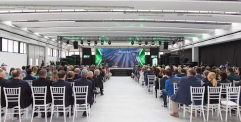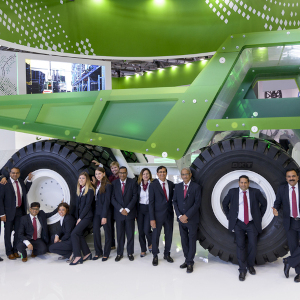The urgent need to address climate change has brought the concept of achieving net zero carbon emissions to the forefront of global discussions. Understanding and embracing net-zero carbon emissions is crucial to creating a sustainable future. In this episode of Global Trends OTR, watch as they explore the pressing issue of decarbonizing the mining sector. This episode is a great way to examine the challenges and opportunities in aligning mining practices with sustainability goals and innovation to create a greener and more sustainable world.
The fourth episode of Global Trends OTR focused on the subject “Net Zero Low Carbon Emissions”. Join host Saana Azzam and this episode’s special guests - Thomas Koch Blank, Alexander Allen, and Bruno Rafael Santos, as they explore the pressing issue of decarbonizing the mining sector. As the world strives to reach net zero emissions, the mining industry plays a crucial role in supplying minerals for economic growth, revolutionizing metal extraction, and the energy transition.
Net Zero Low Carbon Emissions
Global warming and its consequential impact on climate change worldwide is a reality we are all deeply acquainted with. From this understanding sprang forth the concept of 'Net Zero,' a brainchild of a group of scientists. These professionals realized the urgent need to curtail global warming, necessitating a global equilibrium in our carbon emissions. This balance could be achieved by minimizing these emissions to the closest possible point to zero and counterbalancing any residual emissions through reabsorption from the atmosphere. In our season's final episode, we convened experts from various facets of the mining industry to delve into the most effective strategies for realizing net zero within this sector.
What are we highlighting in this discussion?
Decarbonizing of the Mining Sector:
Because of its position in global economic development and the increasing global demand for minerals, this episode underlines the importance of decarbonizing the mining sector. While some minerals can be reclaimed, an overall demand increase necessitates the continuation of mining. Recycling is essential for lowering total energy usage throughout the mining value chain. Mineral decarbonization initiatives should focus on extraction and the transformation of raw materials into pure minerals.
Innovative Solutions:
Join us as leading experts describe how decarbonization in mining is achievable through various technological solutions they have tried and tested. They also share some of the benefits they've observed thus far, such as increased energy efficiency and reduced emissions. Large-scale technology testing and agreements from mining corporations point to a feasible route toward net-zero targets. Exploration of hybrid solutions such as battery electric drive trains, traditional engines, overhead power supply, drop-in fuels, and hydrogen is one example of how the mining industry may significantly contribute to decarbonization efforts.
Recycling and Sustainable Metal Extraction:
In this insightful episode, our guests also explore an innovative technology known as "electro-extraction" that revolutionizes the process of refining metals. This groundbreaking invention, developed by a visionary company, aims to redefine metal extraction by emphasizing the utilization of metals already in circulation. Doing so effectively reduces the environmental and financial burdens typically associated with conventional mining and refining methods.
Economic and Environmental Benefits:
Don’t miss out on how new technology enhances the environmental credentials of metal extraction by lowering transportation distances, supply chain timing, and greenhouse gas emissions. This will also allow for establishing smaller-scale mining operations, decreasing waste, energy consumption, and carbon footprint.
Next Steps and Future Prospects:
Additionally, we walk through ideas for implementing a methodology to establish closed-loop supply chains with original equipment manufacturers (OEMs). This process entails improving materials for reuse in their operations, with a particular emphasis on scrap recycling in the mining and refining industries. The technology involved is primarily powered by energy and water, with the option of recycling water to reduce waste.
The mining sector's decarbonization and adoption of innovative solutions are essential for achieving global net zero emissions and ensuring a sustainable mineral supply while minimizing carbon emissions.
Who’s joining us?
Thomas Koch Blank -Senior Principal in Climate Aligned Industries Program at RMI, USA.
Thomas Koch Blank oversees activities at RMI to promote the use of green hydrogen in heavy industries. Thomas is a leader of a portfolio of initiatives focused on accelerating clean energy technology and decarbonizing heavy industry, with experience in sustainability, energy and resource efficiency, renewable energy and mining and minerals, hydrogen, and solar system design. Before joining RMI, Thomas was a member of McKinsey & Company's Sustainability and Resource Productivity practice, where he advised the world's top corporations on the decarbonization of their production and supply chains. He also worked as a senior counselor to national governments, helping them develop and implement sustainability plans.
Alexander Allen - Director of business development and Head of Mining at NTH Cycle USA
Alexander Allen began his career as a geologist, earning valuable experience working for various exploration businesses in various commodities and nations. Following his geological career, Alexander transitioned into natural resources investment banking, spending eight years in London focusing on capital markets and mergers and acquisitions.
Bruno Rafael Santos - Field Engineer At BKT Europe, Portugal.
Bruno Santos has over ten years of expertise in assessing innovative technologies, products, and services in the tire area. Currently, he is a tire field test engineer, with his in-depth understanding of the tire business and his technical expertise, he can collaborate with cross-functional teams that have been critical in the successful creation of new products and services. Bruno is dedicated to developing novel ways to improve tire performance and safety. His dedication to constant improvement distinguishes him as a valuable specialist in the tire sector.
Where can I watch Episode Four?
Excited to know everything about Net Zero Carbon Emissions ? Click here to watch the full episode!
For more information about BKT's comprehensive Global Trends OTR series, refer to the following links:
- Episode One: Technology, Automation, and Robotics in OTR - watch here.
- Episode Two: Sustainability and ESG - watch here.
- Episode Three: Alternative Energies - watch here.
- Episode Four: Net Zero and Low Carbon Emissions - watch here.






.jpg)